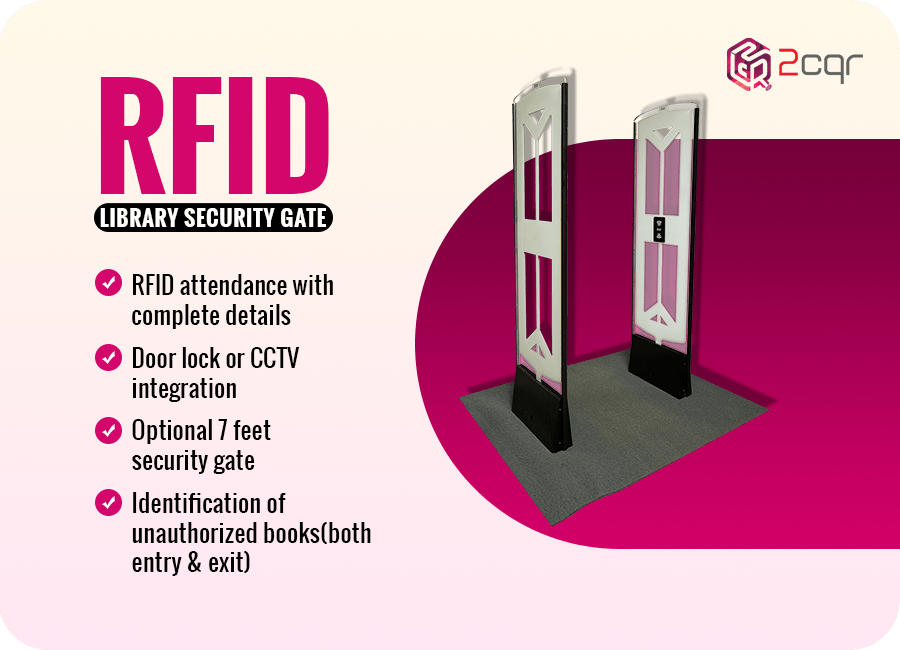
RFID tags are most essential to have the active communication with the readers and the database to execute various activities from check-in to prevent the theft of valuable assets with RFID based library management….
However, safeguarding the custom data that is read by the tags each and every time the transaction has completed is most important to retain the trust of the users and name of the library …
Here are the 5 best ways to secure the customer or asset related data stored in the tags
Data Maintenance
Regularly deleting unnecessary data and fine-tuning data reading settings are pivotal steps to safeguard valuable information stored in RFID tags. By periodically reviewing and removing redundant or obsolete data, you ensure that only pertinent and crucial information remains accessible. This practice not only enhances security but also optimises storage capacity, thereby extending the lifespan of the RFID tags themselves. Moreover, adjusting the data reading settings ensures that only essential information is accessible, minimising the risk of sensitive data falling into unauthorised hands.
Controlled Access
Granting access to RFID tag data should be a strategic decision, ensuring that only authorized individuals have the privilege to manage and manipulate the stored information. Allowing unrestricted access to everyone poses significant risks, potentially exposing sensitive data to unauthorized users.
Implementing stringent access control measures is paramount. Limiting access to a select group of individuals based on their expertise, role within the organization, and proper accreditation ensures that only those with the requisite knowledge and clearance can interact with the data stored on the RFID tags.
By carefully managing access permissions, organizations can significantly reduce the likelihood of critical data falling into the wrong hands, bolstering data security and confidentiality.
Implementing a Clear Privacy Policy
Crafting a comprehensive privacy policy is a crucial step in ensuring the protection of data stored on RFID tags. This policy serves as a guide for staff and users, outlining the specifics of data collection, its purpose, protective measures, and permissible usage.
A well-defined privacy policy should highlight the types of information collected through RFID tags, the purposes behind its collection, and delineate the protective measures in place to safeguard this data. This transparency fosters an understanding among staff and users, cultivating a culture of responsible data handling and mitigating the risk of misuse or mishandling.
Enforcing Robust Authentication Standards
Implementing stringent authentication protocols is paramount in securing the security of data stored within RFID tags. Maintaining highly encrypted passwords and employing sophisticated encryption mechanisms acts as a crucial barrier against unauthorized access.
Utilizing passwords or encryption keys that are complex, unique, and known only to authorized personnel substantially reduces the risk of data breaches. This restricted access control ensures that only individuals possessing the requisite credentials can access and manipulate the data embedded within the RFID tags.
Furthermore, adhering to industry-standard security practices during the design and manufacturing stages of RFID tags is fundamental. By integrating cutting-edge security measures right from the inception, the tags are fortified against vulnerabilities, making them resilient to potential breaches.
Ongoing Training for Data Security Awareness
In the pursuit of safeguarding data stored within RFID tags, continuous training and awareness programs are indispensable. Despite robust security measures in place, lack of awareness among staff can inadvertently lead to costliest mistakes. Conducting regular training sessions empowers employees with the knowledge and understanding necessary to effectively implement data protection measures.
These training programs should encompass various aspects, including:
Data Breach Awareness: Educating staff about the potential risks and consequences of data breaches instills a sense of responsibility. Understanding the implications helps them recognise and promptly address potential threats, thereby mitigating risks proactively.
Importance of Data: Highlighting the significance of the data stored within RFID tags fosters a sense of ownership and accountability among employees. Emphasising the value of data encourages them to handle it with utmost care and vigilance.
Company Privacy Policies: Providing comprehensive insights into company privacy policies and security standards equips employees with the guidelines required to handle sensitive data. This ensures that data is managed in accordance with established protocols and regulations.
By regularly educating and updating the staff on data protection practices, companies can significantly fortify their defence against potential security breaches. Well-informed and vigilant employees are a crucial line of defence in ensuring the integrity and security of data stored within RFID tags.


